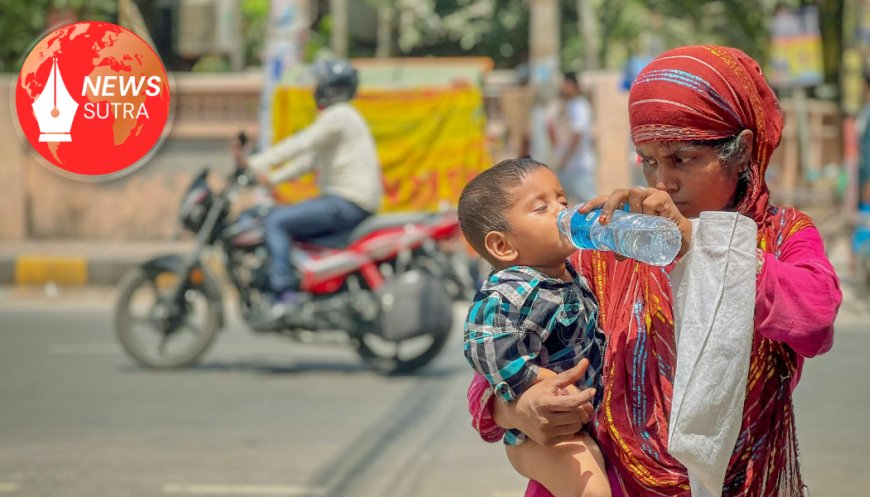Scorching Crisis: Severe Heatwave Grips Delhi & Haryana—IMD Issues Red Alert
IMD has issued a red alert for Delhi and Haryana as a severe heatwave scorches the region. Learn about the health risks, safety tips, and official advisories in this urgent weather update.

As temperatures soar past 47°C in parts of Delhi and Haryana, the India Meteorological Department (IMD) has issued a Red Alert for the region, warning of extreme heatwave conditions that pose serious health risks to the public. The heatwave, driven by prolonged dry spells and hot westerly winds, has already begun to disrupt daily life, with hospitals reporting an uptick in heat-related ailments.
Record-Breaking Temperatures Across the Region
According to IMD's latest bulletin, cities like Rohtak, Hisar, and Bhiwani in Haryana, along with Delhi's Palam and Najafgarh areas, have recorded temperatures ranging between 46°C and 48°C—well above the normal range for early June. The urban heat island effect in Delhi has worsened the situation, especially in areas with limited tree cover and high concrete density.
What is a Red Alert and Why It Matters
The Red Alert is IMD's highest warning level, indicating extreme weather that could lead to heatstroke, dehydration, and even fatalities if precautions are not taken. Vulnerable groups such as the elderly, young children, and people with pre-existing health conditions are especially at risk.
Dr. Rajeev Malhotra, a senior physician at AIIMS New Delhi, warns, "This kind of persistent heat can be life-threatening. Hydration and limiting exposure are critical right now."
Key Health Risks During Severe Heatwaves
Heatwaves don't just make life uncomfortable—they can be lethal. Here are the most common health risks:
-
Heatstroke: Body temperature may rise above 104°F, potentially leading to unconsciousness.
-
Heat Exhaustion: Symptoms include dizziness, weakness, and excessive sweating.
-
Dehydration: Rapid fluid loss can cause electrolyte imbalance and muscle cramps.
-
Respiratory Issues: Poor air quality worsened by heat can aggravate asthma and COPD.
For a comprehensive guide on how to manage health during extreme weather, refer to MedlinePlus' heat illness resource.
Government Advisory and Emergency Measures
The Delhi Disaster Management Authority (DDMA) and Haryana’s Health Department have both activated emergency protocols. Here are some of the measures underway:
-
Water Tankers are being deployed in low-income neighborhoods.
-
Hospitals are on High Alert, especially emergency wards.
-
Work-from-home advisories issued for government and private employees where feasible.
-
School Timings Reduced to minimize exposure for children.
For the latest updates and public safety information, citizens are urged to follow the official NDMA heatwave preparedness guidelines.
How You Can Stay Safe: Expert-Backed Tips
-
Hydration is Key: Drink water every 30 minutes, even if you’re not thirsty. Avoid alcohol and caffeine.
-
Avoid Direct Sun: Stay indoors during peak heat hours (12 PM to 4 PM).
-
Wear Light Clothing: Cotton fabrics in light colors reflect heat better.
-
Use Cooling Methods: Wet towels, fans, and cool showers can help reduce body temperature.
-
Check on Vulnerable People: Ensure that elderly neighbors or those with medical conditions are not left alone.
If symptoms like confusion, dizziness, or rapid pulse occur, seek emergency care immediately.
Impact on Daily Life and Economy
This heatwave is not only a public health crisis but also a blow to regional productivity. According to a report by The Energy and Resources Institute (TERI), extreme heat leads to a 6-10% drop in outdoor labor productivity, affecting sectors such as construction, agriculture, and delivery services.
Power grids are under pressure due to increased air conditioner usage, and water scarcity is a growing concern, especially in parts of Gurugram and South Delhi.
Climate Change Connection
Experts suggest that the increasing frequency and intensity of heatwaves are tied to climate change. A 2023 report by the Intergovernmental Panel on Climate Change (IPCC) warns that South Asia will continue to face longer, more intense heatwaves if global emissions are not curbed.
For more scientific insights, visit IPCC’s official site.
Final Word
With the mercury refusing to dip, this is not the time for complacency. Authorities are doing their part, but individual awareness and action are vital. Stay indoors, stay hydrated, and stay informed through official weather advisories and credible health sources.
For frequent weather updates, visit Skymet Weather.











